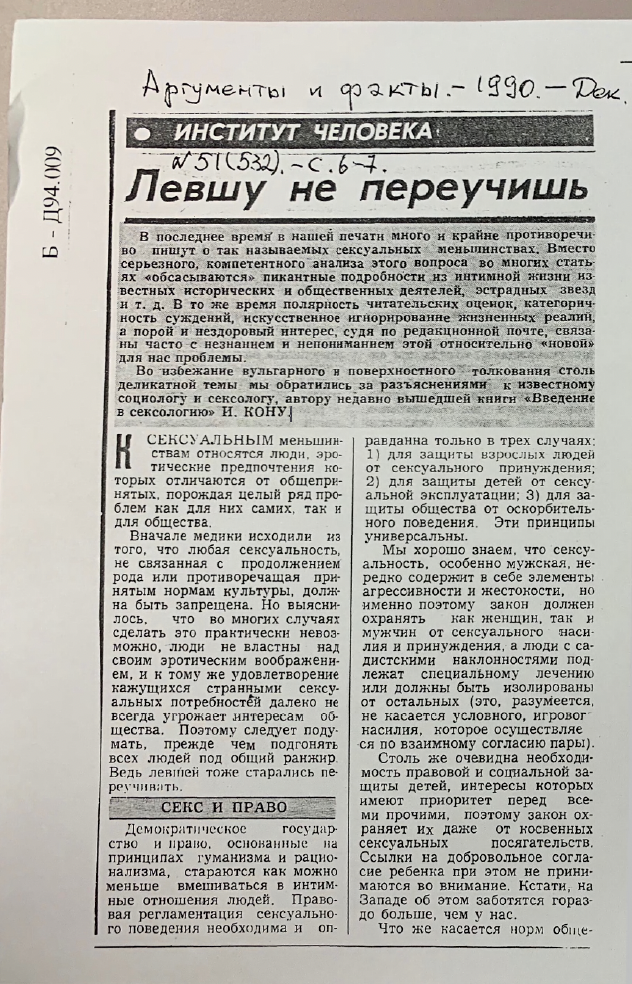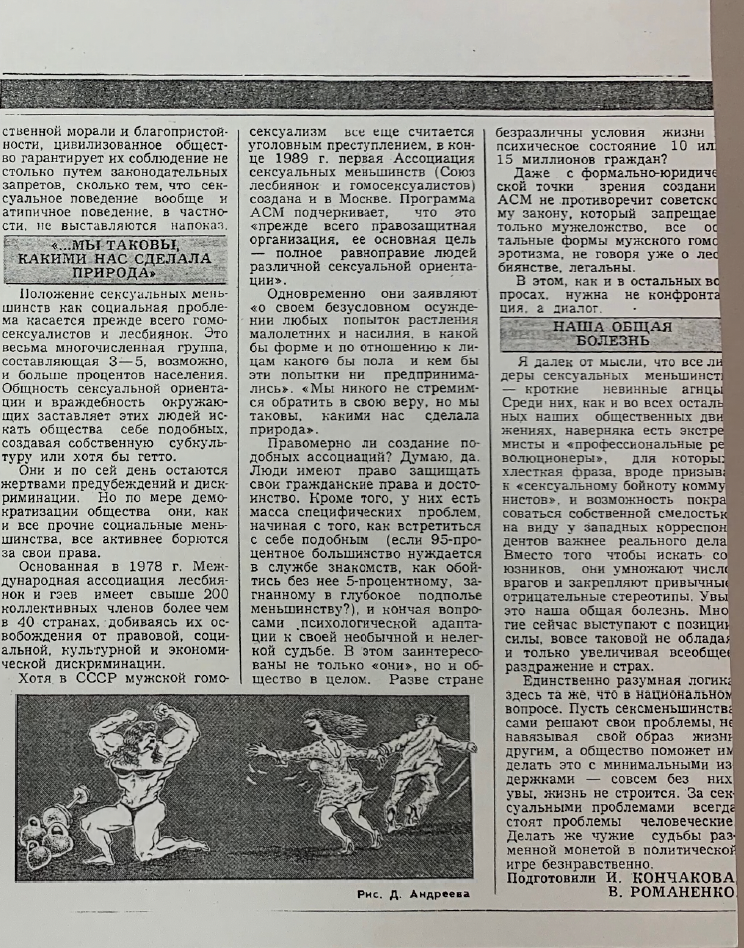Filed Under: Print > Journalism > You Can't Teach the Left-handed to Be Right-handed
You Can't Teach the Left-handed to Be Right-handed
[2 items]
Institute of Man
You Can't Teach the Left-handed to be Right-handed
Recently, our press has been publishing numerous and extremely contradictory articles about so-called sexual minorities. Instead of serious, competent analysis of this issue, many articles dwell on salacious details from the intimate lives of well-known historical and public figures, entertainment stars, etc. At the same time, the polarized reader opinions, categorical judgments, artificial ignoring of life's realities, and sometimes unhealthy interest, judging by editorial mail, are often connected with ignorance and misunderstanding of this relatively "new" problem for us.
--
To avoid vulgar and superficial interpretations of such a delicate topic, we turned for clarification to the well-known sociologist and sexologist I. KON, author of the recently published book "Introduction to Sexology."
--
Sexual minorities include people whose erotic preferences differ from the generally accepted ones, creating a number of problems both for themselves and for society.
--
Initially, medical professionals assumed that any sexuality not connected with procreation or contradicting accepted cultural norms should be prohibited. But it became clear that in many cases this is practically impossible - people have no control over their erotic imagination, and moreover, satisfying seemingly strange sexual needs doesn't always threaten society's interests. Therefore, one should think carefully before forcing all people into the same mold. After all, they used to try to retrain left-handed people too.
--
Sex and Law
--
A democratic state and legal system based on principles of humanism and rationalism try to interfere as little as possible in people's intimate relationships. Legal regulation of sexual behavior is necessary and justified only in three cases: (1) to protect adults from sexual coercion; (2) to protect children from sexual exploitation; (3) to protect society from offensive behavior. These principles are universal.
--
We know well that sexuality, especially male sexuality, often contains elements of aggression and cruelty, but precisely for this reason the law must protect both women and men from sexual violence and coercion, while people with sadistic tendencies should undergo special treatment or be isolated from others (this, of course, does not apply to conditional, role-playing violence that occurs by mutual consent).
--
Equally obvious is the need for legal and social protection of children, whose interests take priority over all others, which is why the law protects them even from indirect sexual encroachment. References to a child's voluntary consent are not taken into consideration. Incidentally, in the West they are much more concerned about this than we are.
As for the norms of public morality and decency, civilized society guarantees their observance not so much through legislative prohibitions, but by ensuring that sexual behavior in general, and atypical behavior in particular, is not displayed publicly.
--
"...We are as nature made us"
--
The position of sexual minorities as a social problem primarily concerns homosexuals and lesbians. This is a very large group, comprising 3-5 percent, possibly more, of the population. The commonality of sexual orientation and hostility from others forces these people to seek out others like themselves, creating their own subculture or at least a ghetto.
--
They remain victims of prejudice and discrimination to this day. But as society democratizes, they, like all other social minorities, are increasingly fighting for their rights. Founded in 1978, the International Association of Lesbians and Gays has over 200 collective members in more than 40 countries, working for their liberation from legal, social, cultural, and economic discrimination.
--
Although male homosexuality is still considered a criminal offense in the USSR, at the end of 1989, the first Association of Sexual Minorities (Union of Lesbians and Homosexuals) was established in Moscow. The ASM program emphasizes that it is "primarily a human rights organization, its main goal being complete equality for people of different sexual orientations."
At the same time, they declare "their unconditional condemnation of any attempts at child molestation and violence, in whatever form and toward persons of whatever gender, and by whomever these attempts might be made." "We do not seek to convert anyone to our beliefs, but we are as nature made us."
--
Is the creation of such associations legitimate? I think so. People have the right to defend their civil rights and dignity. Additionally, they have many specific problems, from how to meet others like themselves (if the 95-percent majority needs dating services, how can the 5-percent minority, driven deep underground, manage without them?), to questions of psychological adaptation to their unusual and difficult fate. This concerns not only "them" but society as a whole. Is the country indifferent to the living conditions and mental state of 10 or 15 million citizens?
--
Even from a formal legal standpoint, the creation of the ASM does not contradict Soviet law, which prohibits only male homosexual acts; all other forms of male homoeroticism, not to mention lesbianism, are legal.
--
In this, as in other matters, what we need is not confrontation, but dialogue.
--
Our Common Illness
--
I am far from thinking that all leaders of sexual minorities are meek innocent lambs. Among them, as in all our other social movements, there are surely extremists and "professional revolutionaries" for whom a catchy phrase like a call for a "sexual boycott of communists" and the opportunity to show off their own courage in front of Western correspondents is more important than real work. Instead of seeking allies, they multiply enemies and reinforce familiar negative stereotypes. Alas, this is our common illness. Many now take positions of strength without actually possessing such strength, only increasing universal irritation and fear.
--
The only reasonable logic here is the same as in the national question. Let sexual minorities solve their own problems without imposing their lifestyle on others, and society will help them do this with minimal costs—life, unfortunately, cannot be built entirely without them. Human problems always stand behind sexual ones. Making other people's fates a bargaining chip in a political game is immoral.
--
Prepared by I. KONCHAKOVA, V. ROMANENKO
The expert cited in this article, Igor Kon (1928-2011), was a prominent sociologist and psychologist specializing in the sociological dimensions of sexual relationships. An influential public intellectual, he was widely read in the press and very visible in 1990s Russian media. Published in the weekly newspaper Argumenty i fakty (Arguments and facts, 1978-) almost exactly one year before the collapse of the Soviet Union, this piece offers an open, matter-of-fact view of democratic values and implicitly claims individuals’ broader right to a private sphere free from Soviet-style state interference. The authors present tolerance and respect toward “sexual minorities” (meaning gays and lesbians) as representing an enlightened, democratic balance between societal and individual needs.
In discussing this balance between societal and individual interests, Kon disaggregates homosexuality from legitimately abhorrent forms of sexual deviance like those involving violence or minors. As is often the case in discussions of sexual difference in Russia, the article’s title associates homosexuality with left-handedness. In this framing, homosexuality is an innate and intrinsic difference from the majority that confers a valuable alterity of perspective on the world.
Kon had moved from a career in the history of philosophy, to sociology, to focusing specifically on sexuality in the 1980s. His first monograph on the subject was published in Hungary in 1985 and circulated in samizdat editions in Russia until the first Russian edition was finally published in 1988. He was among the first, if not the first, among Soviet scientists to speak out against the criminalization and pathologization of homosexuality. He became a prominent media figure in the later 1980s as glasnost gave rise to a relatively open discourse about sex—a novelty in the Soviet Union.
ssArgumenty i fakty, whose circulation exploded during perestroika, regularly engaged with questions related to homosexuality. In August 1991 it would publish, with some hesitation, a public opinion survey where 30 percent of respondents approved of imprisoning homosexuals, another 30 of the death penalty, another 30 of medical treatment, and only 10 percent thought homosexuals should be free to live their lives in peace. At the beginning of the post-Soviet era, some high-circulation media were contending very openly with attitudes, beliefs, and phobias around homosexuality inside Russia, including publishing the opinions of an expert like Kon, who advocated for acceptance of homosexuality as a normal part of life.
These forays into tolerance were not to last. In 2013, the imperative to protect minors from potentially damaging sexual information or experience became the pretext for Russia’s so-called “anti-gay propaganda law,” whose letter prohibits “propaganda of non-traditional sexual relationships in the presence of minors.” In practice, however, it criminalizes any public expression of LGBTQ identity. In the 1990 article from Argumenty i fakty, Kon had mentioned that homosexual acts between males are still proscribed by Article 121 of the Criminal Code of the Russian Soviet Federative Socialist Republic, a law that would remain on the books until May 1993. Unlike its predecessor, the 2013 law does not specifically prohibit private sexual acts between consenting adults, but is written in deliberately broad language to encompass any public expression of LGBTQ identity.

